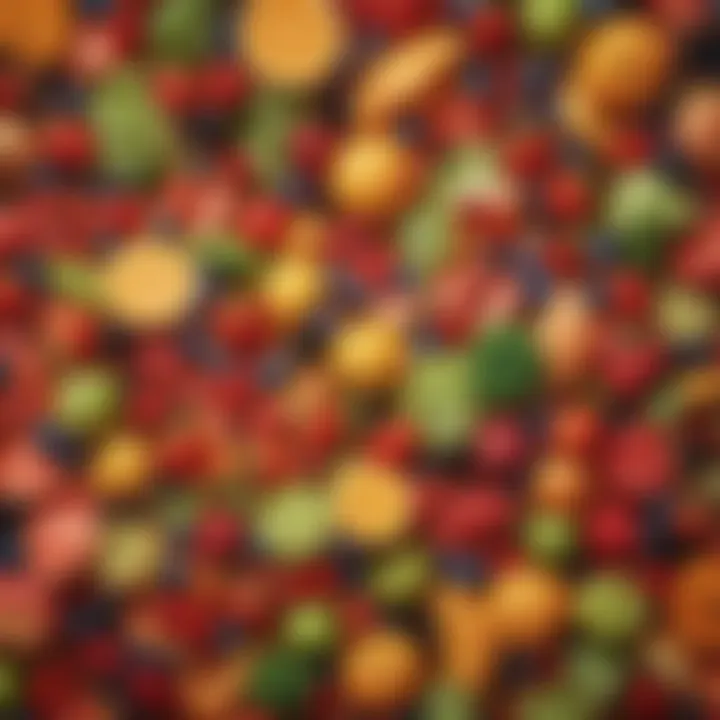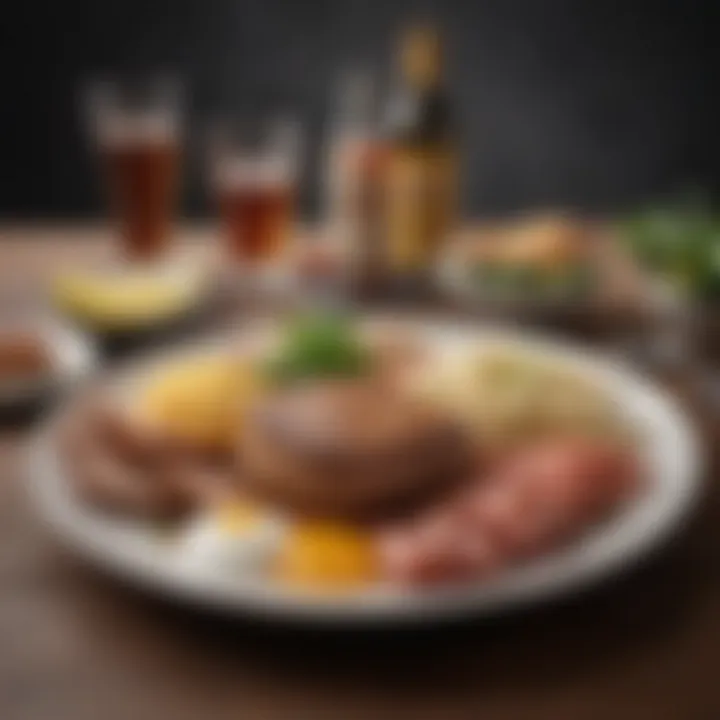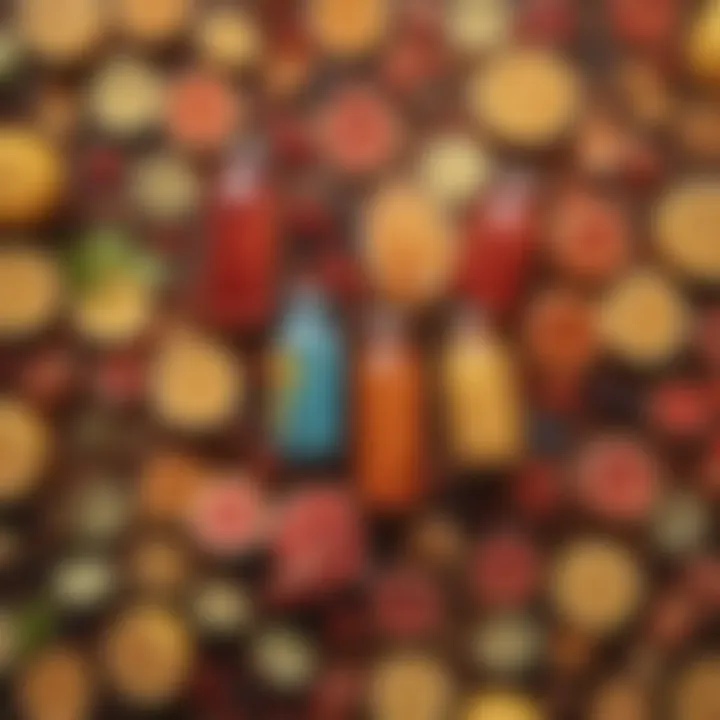Best Food Choices to Prevent Hangovers Effectively


Intro
Alcohol consumption is intertwined with social gatherings, celebrations, and personal moments. Yet, it is often followed by uncomfortable repercussions, commonly known as hangovers. These results stem from various biochemical processes that occur in the body when alcohol is consumed. Hence, understanding what to eat while drinking may significantly reduce hangover symptoms. This article focuses on different food choices that provide essential nutrients. Through exploring hydration, electrolytes, proteins, and carbohydrates, readers will receive guidance for meal planning that may enhance their drinking experiences. Key recipes will also be presented to further illustrate these concepts.
Recipe Overview
A balanced meal is invaluable when drinking to mitigate negative effects. One such dish to consider is a hearty chicken and quinoa salad. This dish combines protein-rich chicken with nutrient-dense quinoa, providing necessary crafting for the body to process alcohol more efficiently.
Originating in South America, quinoa has been cherished for centuries. It is often termed a superfood, given its amino acid content and other beneficial nutrients. The pairing with chicken not only raises protein levels but also aids in overall hydration.
Ingredients List
This section provides a comprehensive list of ingredients essential for preparing the chicken and quinoa salad:
- 1 cup quinoa
- 2 cups water or low-sodium chicken broth
- 1 pound chicken breast
- 1 tablespoon olive oil
- 1 teaspoon garlic powder
- Salt and pepper to taste
- 1 cup cherry tomatoes, halved
- 1 cup cucumber, diced
- 1/4 cup red onion, finely chopped
- Fresh parsley or cilantro for garnish
Special ingredient notes
- Quinoa: This can be found in most grocery stores. Look for tri-color quinoa for added appeal and nutrients.
- Chicken: Consider using organic chicken for better quality. If you prefer a vegetarian option, chickpeas can be used as a replacement.
- Broth: Low-sodium broth is advisable for controlling sodium intake, which can help maintain hydration during consumption.
Understanding Hangovers and Their Causes
Understanding hangovers is crucial when examining the effects of alcohol on our bodies. As we consume alcoholic drinks, the potential for negative aftereffects increases. Gain a deeper insight into the mechanics of a hangover helps in making informed choices about food that can alleviate or even prevent these unpleasant symptoms.
Definition of a Hangover
A hangover refers to a group of unpleasant physical and mental symptoms that occur after the consumption of alcohol. These symptoms can include headache, fatigue, dehydration, dizziness, and nausea. The severity of hangover can vary widely from person to person and is influenced by factors such as drinking quantity, type of alcohol consumed, hydration levels, and individual health conditions.
Biochemical Mechanisms Behind Hangovers
Hangovers stem from several biochemical processes in the body. One primary factor is the toxic effect of ethanol, the active ingredient in alcoholic beverages. When alcohol is metabolized, it converts into acetaldehyde, a compound that is even more toxic than ethanol itself. This compound gradually breaks down into less harmful substances but can lead to inflammation and oxidative stress.
Moreover, alcohol affects neurotransmitter balance. It suppresses the level of glutamate, a key chemical for brain function, but increases gamma-aminobutyric acid (GABA), which has a sedative effect. This interplay can disturb the body's normal state, leading to cognitive sluggishness often felt during a hangover.
Common Symptoms and Their Impact
Common symptoms of a hangover can significantly affect daily functioning. Headaches and fatigue are the most prevalent, caused by dehydration and reduced sleep quality. Nausea and sensitivity to light and sound can further inhibit productivity. Not only do these symptoms disrupt personal well-being, but they can also impact social interactions, affecting both personal and professional relationships.
Engaging in pre-drinking meal planning can mitigate some of these effects. Focused dietary choices can help maintain hydration, regulate blood sugar levels, and replenish vital nutrients, potentially softening the blow of a hangover. Understanding these mechanisms fosters a better approach to alcohol consumption and recovery strategies.
The Role of Food in Alleviating Hangover Symptoms
Food plays a significant part in shaping the body's response to alcohol. Consuming the right nutrients can mitigate some of the adverse effects associated with hangovers. When alcohol enters the bloodstream, it affects various biological mechanisms, contributing to dehydration, nutrient depletion, and electrolyte imbalance. By addressing these issues through food, it is possible to lessen the severity of a hangover after drinking.
Nutrients Essential for Recovery
Understanding which nutrients aid in recovery is crucial. These include:
- B vitamins: These vitamins play a pivotal role in energy metabolism and help the liver process alcohol effectively. Foods like whole grains, lean meats, and legumes are rich in B vitamins.
- Vitamin C: This antioxidant supports the immune system and can help with the symptoms of a hangover. Citrus fruits, bell peppers, and berries are excellent sources.
- Magnesium: This mineral helps maintain muscle and nerve function, and its presence can be depleted through alcohol consumption. Foods like spinach, nuts, and seeds provide magnesium.
- Zinc: This mineral is important for immune function and anti-inflammatory responses. Shellfish, meat, and legumes can be good sources.
Mindfully incorporating foods rich in these nutrients can be beneficial. For instance, preparing a meal of quinoa, grilled chicken, and steamed broccoli before a night out can provide a strong nutritional foundation to counteract the effects of alcohol.
Hydration and Electrolyte Balance
Dehydration is one of the leading causes of hangover symptoms. Alcohol is a diuretic, which means it increases urine production, leading to fluid loss. Therefore, it is crucial to maintain both hydration and electrolyte balance while drinking.
Incorporating hydrating foods into the drinking experience helps. Water-rich foods like cucumbers, watermelon, and oranges contribute to fluid intake.
Furthermore, electrolyte-rich options play an essential role in recovery. Electrolytes include sodium, potassium, and chloride, which help maintain fluid balance and support muscle function. Consuming salty snacks, like pretzels or popcorn, along with drinking water can assist in replenishing these important minerals.
Consider beverages like coconut water or sports drinks as well, as they contain electrolytes and can help restore balance post-drinking.


"Maintaining proper hydration and electrolyte levels can significantly reduce hangover severity"
By focusing on these dietary approaches, it becomes possible to alleviate hangover symptoms effectively. The right food choices matter not just before and during drinking, but also in the manner of recovery after a night out.
Recommended Foods Before Drinking
Eating the right food before consuming alcohol is crucial to mitigating the effects of a hangover. The benefits of planning your pre-drinking meal cannot be understated. Food sets the stage for your body to handle the influx of alcohol, providing essential nutrients that aid in digestion, absorption, and metabolism. The right choices enhance hydration and create a buffer against the potential harshness of alcohol on the system.
When thinking about what to eat, consider complex carbohydrates, protein-rich foods, and healthy fats. Each category contributes uniquely to your body’s defense against the effects of alcohol.
Complex Carbohydrates
Complex carbohydrates are starches that consist of long chains of sugar molecules. Foods such as whole grains, brown rice, and oats belong in this group.
Consuming complex carbohydrates before drinking helps maintain blood sugar levels. They provide a sustained source of energy.
- Benefits: These foods slow down the absorption of alcohol into the bloodstream. They also provide fiber, promoting better digestive health.
- Examples: Interesting options include quinoa, barley, and whole grain pasta.
- Consideration: It’s important to avoid simple sugars before drinking, as they may spike blood glucose and lead to a crash later.
Protein-Rich Foods
Protein is another critical component. Foods high in protein such as chicken, fish, tofu, and legumes build a solid defense against alcohol's dehydrating effects.
- Role: Protein-rich foods offer amino acids that support liver function, vital for alcohol metabolism.
- Examples: A light meal incorporating grilled chicken with quinoa or a bean salad serves both taste and purpose.
- Consideration: Keep protein portions moderate to avoid feeling too heavy while drinking.
Healthy Fats
Incorporating healthy fats can also play a significant role. Fats are essential for nutrient absorption, especially fat-soluble vitamins. They are key in slowing the absorption of alcohol into the bloodstream.
- Sources: Avocados, olive oil, and nuts are excellent choices.
- Benefits: They provide lasting energy and keep you feeling satiated, which might prevent overindulging later.
- Consideration: Moderation is key. Too much fat might lead to digestive discomfort when combined with alcohol.
"A well-planned meal can significantly reduce the severity of a hangover."
By understanding the importance of these food groups, you can effectively prepare your body before drinking. Combining these elements will not only improve your overall experience but also make it easier for your body to cope with alcohol. Thus, making informed food choices before drinking is an investment in your well-being.
Foods to Consume While Drinking
Choosing the right food while consuming alcohol is a critical factor in minimizing hangover symptoms. The food intake during drinking not only impacts the absorption of alcohol but also plays a role in maintaining our energy levels. Focused food choices can provide essential nutrients and hydration, enhancing overall well-being.
When we drink alcohol, it can lead to dehydration and electrolyte imbalances. Therefore, incorporating specific foods while drinking can mitigate these effects. Citrus fruits, dairy products, and salty snacks are particularly noteworthy due to their unique benefits.
Citrus Fruits and Their Benefits
Citrus fruits, such as oranges, lemons, and grapefruits, are excellent choices during alcohol consumption. They are packed with vitamin C, which supports the immune system, and antioxidants that help combat oxidative stress. The high water content in citrus fruits also aids hydration.
Eating citrus fruits can stimulate digestion and help maintain gastric health. The acidity may encourage the stomach to process food more efficiently, preventing that heavy feeling some experience during drinking. A few slices or a glass of citrus juice can refresh and invigorate, making them not just tasty, but also functional.
Dairy Products as a Buffer
Dairy products, like yogurt or cheese, can serve as an effective buffer when consuming alcohol. The proteins and fats present in these foods slow down the absorption of alcohol into the bloodstream, allowing the body to metabolize it more evenly. This controlled absorption can minimize the peak blood alcohol concentration, which may lessen hangover effects.
Dairy also contains essential nutrients like calcium and B vitamins, which are vital for energy metabolism. For some, the creamy texture of dairy products may provide a soothing sensation, which can be quite pleasant during social drinking.
Salty Snacks and Their Hydration Properties
Salty snacks, including pretzels and popcorn, are often overlooked as beneficial during drinking sessions. These snacks can promote thirst, encouraging fluid consumption, which is essential for hydration. Sodium helps retain water in the system, preventing excessive fluid loss during alcohol consumption.
However, it is important to be mindful of the quantity consumed. Too much salt can have adverse effects. Therefore, pairing salty snacks with water can keep the body properly hydrated. This combination can be a strategic move to help steer clear of the post-drinking dehydration many encounter.
Foods consumed while drinking can significantly influence the severity of hangovers. Choose wisely to support hydration and reduce discomfort.
Post-Drinking Food Choices


After a night of drinking, the choices of food become very important to help the body recover. The right food can make a significant difference in how one feels the next day. It is not just about replenishing what was lost but also about choosing options that aid in functional recovery. Considering the body's needs at this point is essential for mitigating hangover symptoms and restoring balance.
The post-drinking phase is the time to focus on three main areas:
- Re-hydration
- Electrolyte replenishment
- Comfort foods for psychological relief
Re-hydrating Foods and Drinks
Hydration is a key concern after drinking alcohol. Alcohol is a diuretic, which means it causes the body to lose more fluids than usual. Re-hydrating foods and drinks are significant since they provide not only water but also vital nutrients.
Some of the best options include:
- Watermelon: Contains a high water content, making it effective for hydration.
- Coconut water: Naturally rich in electrolytes, it helps to replenish lost minerals.
- Herbal teas: They are soothing and hydrating, beneficial for restoring fluids.
- Electrolyte-rich drinks: Some sports drinks offer a nice blend of hydration and electrolytes.
Drinking water before bed and upon waking is crucial. Having a glass of water with a slice of lemon can enhance re-hydration by providing vitamin C and flavor.
Electrolyte-Rich Options
Electrolytes play a critical role in bodily functions, especially after alcohol consumption. Sodium, potassium, and magnesium levels may drop due to the diuretic effects of drinking. Including foods that are rich in these minerals helps restore balance.
Consider these options:
- Bananas: High in potassium, they can help prevent muscle cramps.
- Pickles: Rich in sodium, they can replenish lost electrolytes while also being quite savory.
- Avocados: Another great source of potassium and healthy fats, which helps with recovery.
- Yogurt: Contains probiotics and is a source of potassium, making it a double benefit.
Eating a combination of these foods can significantly enhance recovery after drinking.
Comfort Foods for Recovery
Comfort foods can also provide emotional support during recovery after a night of drinking. They should be easy to digest and appealing to the senses. The psychological aspect of feeling better is as critical as the physical recovery.
Some options are:
- Toast with a bit of honey: Simple and easy to digest, providing both carbohydrates and a touch of sweetness.
- Scrambled eggs: They are rich in proteins and relatively soft on the stomach, which helps with satiety.
- Chicken noodle soup: Warm and soothing, it helps provide hydration and protein without being too heavy.
- Rice porridge: Mild in flavor and easy on the stomach, it helps settle any nausea.
In summary, the right choice of food and drinks after a night of drinking can truly make a difference in hangover symptoms. It is about more than hydration; it’s about restoring balance, soothing the body, and providing comfort.
Recipes for Optimal Drinking Support
Cooking and food preparation play a crucial role in supporting the body during drinking sessions. The right recipes can help minimize hangover symptoms by incorporating essential nutrients, ensuring hydration, and maintaining proper electrolyte balance. Crafting meals and snacks that are intentionally designed for when alcohol is present can provide a protective buffer against the adverse effects of drinking. This aspect is vital not only for comfort during the experience but also for aiding recovery afterward.
Pre-Drinking Meal Ideas
Before indulging in alcohol, eating a balanced meal can significantly reduce the potential negative impacts on the body. Here are some meal ideas:
- Whole Grain Pasta with Lean Protein: This combination offers complex carbohydrates and protein, helping to sustain energy levels and provide a stable foundation for drinking.
- Avocado Toast on Whole Grain Bread: Rich in healthy fats and fiber, avocado can provide hydration through its high water content and promote satiety.
- Quinoa Salad with Vegetables: Quinoa is a complete protein and, when paired with colorful vegetables, adds essential vitamins and minerals. This meal packs nutrients that support overall wellbeing.
Employing these meals prior to drinking may better prepare the body to manage alcohol's effects, potentially reducing the risk of a hangover.
Snack Options During Drinking
While drinking, snacking can serve a dual purpose: it keeps the digestive system active and may slow alcohol absorption. Opting for certain snacks can help buffer the impact of alcohol. Here are some effective choices:
- Nuts: Almonds or walnuts can provide healthy fats and proteins. They are easy to snack on and help in maintaining energy levels.
- Cheese and Crackers: This combination offers protein and carbohydrates. Cheese provides fat which can slow alcohol absorption.
- Popcorn: Lightly salted popcorn is a good choice during drinking. It adds salt, which helps with hydration, as sodium plays a role in fluid balance.
These snacks ensure that the body receives some nutrients while drinking, which may help alleviate the next day's discomfort.
Post-Drinking Recovery Meals
After a night of drinking, recovery meals become paramount. Intentionally chosen foods can significantly aid in rejuvenation. Consider the following recovery options:
- Eggs with Spinach: Eggs contain cysteine, which can help break down acetaldehyde, a toxic byproduct of alcohol. Spinach adds iron and vitamins.
- Banana and Yogurt Smoothie: Hydrating and rich in electrolytes, this smoothie can help restore lost nutrients. The potassium in bananas assists in rebalancing electrolyte levels.
- Chicken Soup: A warm bowl of chicken soup can soothe the stomach and effectively hydrate the body. The broth helps in replenishing lost fluids.


The meals following drinking not only contribute to hydration and nutrient replenishment but also provide a comforting experience that supports the body’s recovery process.
The Science Behind Food and Alcohol Interaction
Understanding the relationship between food and alcohol is crucial for mitigating hangover symptoms. Alcohol can affect various bodily functions, which makes food selection during drinking essential. The interplay between the two impacts how well a person feels afterward. Different foods can modify alcohol absorption rates and influence overall health during alcohol consumption.
Metabolism of Alcohol and Food
When alcohol enters the body, the liver metabolizes it. The presence of food can slow this process. When alcohol is consumed without food, it rapidly enters the bloodstream, leading to heightened intoxication and more severe hangover symptoms. In contrast, eating while drinking can lead to a more gradual absorption of alcohol.
Here’s how the body processes it:
- Absorption Rates: Food in the stomach delays alcohol's entry into the small intestine. This medium can reduce the peak blood alcohol concentration (BAC).
- Energy Supply: Foods high in carbohydrates provide glucose, which is an energy source that can counteract the depressant effects of alcohol.
- Digestive Support: Enzymes in food may aid in the breakdown of alcohol, reducing strain on the liver.
Overall, consuming food before or while drinking supports the body in managing alcohol more efficiently, thus potentially alleviating hangover severity.
Effects of Different Foods on Alcohol Absorption
Not all foods affect alcohol metabolism the same way. Certain food types can enhance or inhibit alcohol absorption, impacting intoxication level.
- High Carbohydrate Foods: Foods like bread or pasta slow the absorption of alcohol into the bloodstream. This can help maintain a stable intoxication level.
- Proteins: Lean meats, beans, and nuts provide essential amino acids. They may also stabilize blood sugar levels, easing hangover effects.
- Fats: Though fats coat the stomach lining and can slightly slow absorption, they do not stop it completely. Foods like avocados or cheese can contribute beneficial nutrients and satiation.
It is critical to choose the right combination of foods to optimize the drinking experience. Remember, the goal is to prepare the body to deal with alcohol more effectively, thus reducing the hangover's impact.
"Eating prior to or during alcohol consumption can make a noticeable difference in one's overall drinking experience."
Incorporating specific food types into drinking occasions supports the metabolism of alcohol, leading to better outcomes the next day. By understanding these interactions, individuals can make informed choices that enhance their enjoyment without sacrificing well-being.
Cultural Perspectives on Drinking Foods
Understanding how different cultures approach drinking foods provides valuable insights into the traditions and practices surrounding alcohol consumption. Cultural perspectives not only highlight the diverse ways people enjoy their beverages but also underscore the importance of complementary foods in mitigating the effects of drinking. This section will explore global drinking traditions and specific food pairings that enhance the drinking experience while potentially reducing hangover symptoms.
Global Drinking Traditions
Different cultures have unique drinking traditions that often include specific foods. For instance, in Spain, tapas play an integral role in social drinking. These small plates of food not only provide sustenance but also encourage slower drinking and prolong social interactions. Similarly, in Germany, beer gardens are popular venues where pretzels and sausages accompany the local brews, reinforcing the idea that enjoying food with alcohol can lead to a more balanced experience.
In Japan, izakayas serve small dishes alongside sake and beer, emphasizing the social aspect of drinking. Each of these examples indicates that food is meant to be consumed during drinking, allowing drinkers to enjoy their beverages more responsibly. This shared cultural approach highlights the importance of food in ensuring a more pleasant drinking experience, potentially reducing the likelihood of hangovers.
Food Pairings Specific to Alcohol Types
Pairing specific foods with particular types of alcohol can enhance flavors and mitigate negative effects. Here are several examples:
- Wine and Cheese: Red wines complement aged cheeses well, while white wines often pair with lighter cheeses. The fat content in cheese can slow alcohol absorption.
- Beer and Fried Foods: The carbonation in beer cuts through the richness of fried foods, which can help manage alcohol's effects on the system.
- Spirits and Savory Snacks: Mixing spirits with salty snacks, such as nuts or pretzels, can help with hydration levels and provide necessary electrolytes.
"Food pairings can transform a drinking experience from a potentially harmful one to a more balanced and enjoyable occasion."
End: Making Informed Food Choices When Drinking
Understanding how food interacts with alcohol is crucial for minimizing hangover symptoms. The choices made during drinking can significantly affect how the body processes alcohol and how one feels the next day. Therefore, making informed food choices is not just about taste; it is about enhancing well-being and comfort. This article emphasizes the importance of specific nutrients, hydration, and meal timing in relation to alcohol consumption.
Summary of Key Insights
Several key insights emerge from our exploration of food and drinking. First, consuming complex carbohydrates before drinking can help maintain blood sugar levels and reduce the risk of a hangover. Foods rich in protein, such as chicken and legumes, can stabilize blood sugar and help the body process alcohol more effectively. Additionally, staying hydrated with electrolyte-rich drinks can combat the dehydration associated with alcohol consumption.
Important nutrients to consider include:
- Electrolytes: Such as potassium and sodium found in sports drinks.
- Vitamins: Especially B vitamins, which play a role in energy metabolism.
- Healthy Fats: Foods like avocados and nuts can provide lasting energy.
By carefully selecting food choices during drinking sessions, one can bolster overall health and potentially reduce the likelihood of suffering from hangover effects.
Encouragement for Mindful Drinking
Practicing mindful drinking involves awareness of one's consumption and its impacts, both immediate and long-term. It's beneficial to pay attention to not only what you drink but also what you eat in conjunction with those drinks. Thoughtful food choices can enhance enjoyment while concurrently soothing the harsh effects of alcohol on the body.
This approach encourages readers to listen to their bodies, recognize their limits, and opt for food that supports their drinking experience. Instead of consuming absentmindedly, choose snacks that are nutritious and supportive, such as fruits, nuts, or whole grains. Also, spacing out drinks and alternating alcoholic beverages with water or non-alcoholic options is recommended.
"Mindful drinking is the bridge between enjoyment and responsibility. By making informed food choices, you can enjoy the moment while caring for your health."
Ultimately, embracing informed food choices cultivates a more enjoyable, sustainable relationship with drinking practices. By implementing these strategies, one can navigate drinking situations more effectively and may offer relief from unwanted aftereffects.



